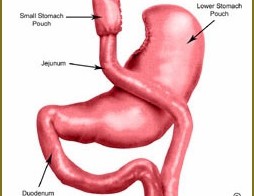Reversión de bypass gástrico laparoscópico en paciente con malnutrición y hepatopatía severa
Background:
Roux-en-Y gastric bypass (RYGB) is one of the most commonly performed bariatric procedures around the world. However, RYGB it sometimes carries the risk of rare but serious long-term complications such as malnutrition and liver failure. We report a case of laparoscopic reversal of RYGB.
Methods:
In March 2017, a laparoscopic RYGB was performed for a 53-year-old female without comorbidities and with a BMI of 54 kg/m2. All laboratory test results at the preoperative evaluation were within the normal range. Abdominal ultrasound revealed moderate hepatic steatosis and oral endoscopy a hiatal hernia with grade B esophagitis.
One year later, patient experienced an important weight loss of 75 kg (from 155 to 80 kg) with a BMI of 28 kg/m2. However, patient presented general weakness, abdominal pain, ascitis lower extremitiy edema, anemia, progressive caloric and protein malnutrition, vitamin (A, D), mineral (copper) and folic acid deficiencies, nonalcoholic steatohepatitis (NASH) and liver function was progressive worsening.
Results:
A laparoscopic reversal of gastric bypass was performed. The operation was successfully performed via laparoscopy. Operating time was 70 minutes. Postoperative was uneventful and patient discharge home at day 6. Hepatic biopsy revealed NASH with steatohepatitis of 80% (Fibrosis F2-3/4).
Eight months after reversal of gastric bypass, patient has improved her clinical situation (no asthenia), maintains of weight (80 kg) and has improved her nutritional status and liver function parameters.
Conclusion:
Laparoscopic reversal of RYGB is technically feasible and might be performed safely after thorough preoperative evaluation in carefully selected patients with malnutrition and liver failure.

 Español
Español English
English